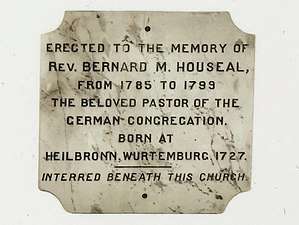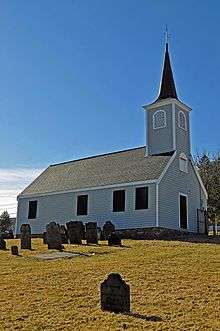Bernard Michael Houseal
Reverend Bernard Michael Houseal (Bernhard Michael Hausihl) (b. Heilbronn, Wurtemberg, 1727 - d. Halifax, Nova Scotia, 9 March 1799) was a German Lutheran minister in North America, and the first resident minister of Frederick, Maryland. He preached at the Evangelical Lutheran Church (Frederick, Maryland) (1752) and was the first German minister of Little Dutch (Deutsch) Church in Halifax, Nova Scotia.[1] [2] [3]He was a Loyalist refugee who escaped New York with his family and slaves.[4] [5][6]

Career
He was a student at the University of Strassburg.[7] He married Sybilla Margaretha Mayer, daughter of Christopher Bartholomew Mayer in the town of Ulm. They moved to Fredericktown, Maryland and established the Evangelical Lutheran Church (1752-1759).[8] The building of the church was slowed as a result of the outbreak of the French and Indian War but was still completed before the war ended (1762). Houseal stayed with the Church for seven years and then moved to Reading, Pennsylvania and served in the Trinity Lutheran Church (1759). After nine years, he went to Easton, PA (1768).
He then went to New York City (1770) where he was the Senior minister in the Trinity Lutheran Church. He became a Governor of New York College (present-day Columbia University) and a corporator of the New York Hospital. He was one of the addressers Richard Howe, 1st Earl Howe. Houseal was an outspoken loyalist and his house and church were burned by the rebels.[9] After 14 years in New York City, he left for Nova Scotia as a loyalist refugee (1784).[10] Rev. Houseal stayed in New York City until the formal evacuation. Before he left the Vestry of Trinity church his congregation presented him with a letter that stated:
- We the Subscribers, Members of the Vestry, Elders, Deacons and Trustees of the Antient Evangelical Trinity Church of the City of New York, for ourselves, and in behalf of our whole Congregation, do testify by these presents, that our hitherto beloved minister, the Reverend Bernard Michael Houseal, during his officiating here, for the space of nearly fourteen years ... And whereas the Lord of the Church has called the said our beloved minister to another Station in His Vineyard, we do cordially and thankfully wish and pray the God of all goodness may send His Blessings further with said Mr. Houseal ... with his beloved family to the place of their Destination, are the servant wishes of the Subscribers - New York, 18th November 1783."[11]
During the first year Houseal was in Nova Scotia, he then went to London to be ordained in the Church of England (1785) and while preaching at the Savoy Chapel, Prince Edward requested he become chaplain of his regiment, after which they both came to Halifax. His son Captain Michael also served as the Duke of Kent's Aide-de-camp and was an author. [12][13][14][15] Rev. Houseal's preaching was so popular that the congregation outgrew the Little Dutch Church and St. Georges Round Church was built. The Church was completed two years after Houseal died. Houseal is buried beneath the Little Dutch (Deutsch) Church (1799). After his death, Prince Edward arranged for his wife and children to live in England.[16]
Gallery
 Rev. Houseal was the first minister in the Evangelical Lutheran Church (Frederick, Maryland) (1752-1759)
Rev. Houseal was the first minister in the Evangelical Lutheran Church (Frederick, Maryland) (1752-1759)%2C_Broadway%2C_New_York_City.png) Rev. Houseal's church Trinity Church in New York City (1770-1783)
Rev. Houseal's church Trinity Church in New York City (1770-1783) Little Dutch Church, Halifax, Nova Scotia (1784-1799)
Little Dutch Church, Halifax, Nova Scotia (1784-1799)
References
- Pioneers of Old Monocacy: The Early Settlement of Frederick County, Maryland ... By Grace L. Tracey, John Philip Dern
- St. George Parish. Collections of the Nova Scotia Historical Society. pp. 83-87
- Report - Society for the History of the Germans in Maryland, Volumes 1-10 By Society for the History of the Germans in Maryland
- C. B. Fergusson, "A Documentary Study of the Establishment of the Negroes in Nova Scotia Between the War of 1812 and the Winning of Responsible Government, "Public Archives of Nova Scotia, Halifax, Publication no. 8,1948, p. 1.
- The Lutheran Church Review, Volume 4 edited by Henry Eyster Jacobs, Theodore Emanuel Schmauk, p. 146
- Memoir and Genealogy of the Maryland and Pennsylvanian Family of Mayer which ... By Brantz Mayer p. 123
- George Leland Summer. Newberry County, South Carolina: Historical and Genealogical Annals, 1950. p. 241
- John Thomas Scharf. History of Western Maryland: Being a History of Frederick ..., Volume 1, p. 467
- https://archive.org/stream/historicalnotice00hawk#page/338/mode/1up/search/nova+scotia
- Eaton, Arthur Wentworth Hamilton (1892). The Church of England in Nova Scotia and the Tory Clergy of the Revolution. T. Whittaker. p. 173. Retrieved 6 June 2020.
- Jacobs, Henry Eyster; Schmauk, Theodore Emanuel (1885). The Lutheran Church Review. 4. Philadelphia: Alumni Association of the Lutheran Theological Seminary. p. 149. Retrieved 6 June 2020.
- pp. 83-87
- p. 122
- Son's Michael Houseal's book about Napoleon
- Memoir and Genealogy of the Maryland and Pennsylvanian Family of Mayer which ... By Brantz Mayer, p.130
- pp.133-145
Further reading
- Bernard Michael Hausihl. Halle Reports, New Ed. p. 426
- Bernard Michael Hausihl. Lutheran Quarterly, Oct., 1883, p. 528